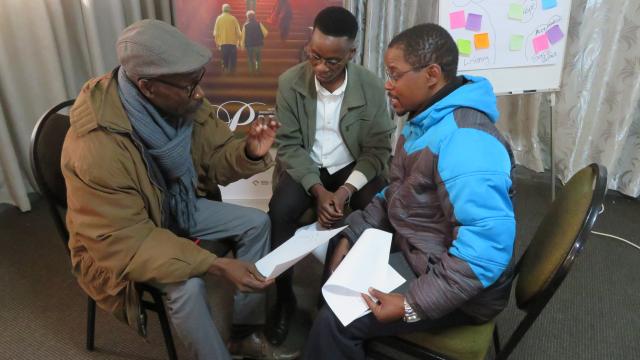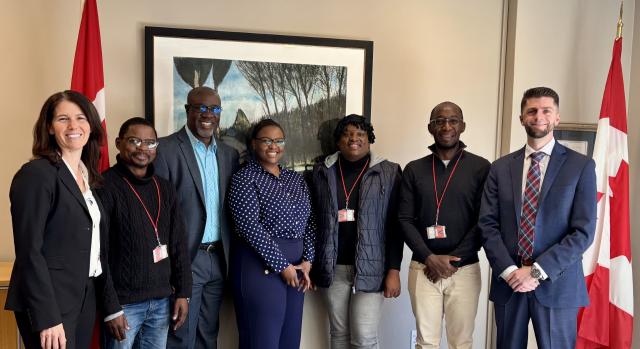Jane Thirikwa shares her experience at the “Faith Beyond Borders” workshop in Johannesburg on LGBTQIA+ inclusion and advocacy in the church.

The United Church of Canada, in partnership with The All Africa Theological Education by Extension Association (AATEEA), a Zambia-based Mission and Service partner, recently brought together denominational church leaders, LGBTQIA+ persons of faith, and representatives from LGBTQIA+ organizations and faith-based institutions to a regional workshop on human sexuality and gender diversity in Johannesburg, South Africa.
Dubbed “Faith Beyond Borders”, the workshop was a place for dialogue and learning to envision a transformative shift in cultural, religious, and social norms. A shift where the church plays a pivotal role in promoting human dignity and rights, fostering reconciliation, and reflecting on the inclusion of people of diverse sexual orientations, gender diversity, and expression.
Through facilitated theological reflections, shared learning, and capacity-building, the participants from South Africa, Mozambique, Zambia, Zimbabwe, and Botswana explored how the church in the region can become more inclusive, affirming, and justice-oriented in its ministries and witness.
Participants situated themselves within a broader historical and spiritual lineage—one marked by exclusion, but now seeking to reclaim radical hospitality. They courageously shared personal journeys of renewal, while listening to their peers’ stories, to silence, and to the Spirit.
Discussing the church’s role within democracy, equality, and non-discrimination in Southern Africa, participants highlighted that gender and sexuality are a key site of struggle in postcolonial African identity, and religion is a critical field in which this struggle takes place.
As LGBTQIA+ people experience a rise in violence, further criminalization, exclusion, and erasure from faith and social spaces across Africa, participants analyzed the power of breaking the silence and of radical affirmation in confronting religious rhetoric cloaked in the myth of tradition and in religious conservatism seeded through colonialism.
Participants reflected on theological tools of intersectional dialogue and learning, and on the tremendous progress of civil society movements in the fight for LGBTQIA+ rights and dignity. Progressive accompaniment models, like the partnership between the Christian Council of Mozambique and LAMBDA Association, an LGBTQIA+ organization, were cited. Decriminalization of same-sex conduct in Botswana and South Africa was celebrated, as was the KwaZulu-Natal Council of Churches social base dialogue program on protection of the rights of sexual minorities. These are possibilities glimpsed for pockets of resistance; collective Kairos moments to build and guide the journey of transformation.
The legacy of colonial-era laws against same-sex conduct, the patriarchal nature of the church in Africa, and the growing global threat of the anti-gender movement were named as key challenges. Many participants have seen the blurred separation of church and state, emboldening anti-LGBTQIA+ rhetoric from conservative religious groups, which is often used as a political strategy.

Two United Church staff and representatives from African partner groups visited the Canadian High Commission in Pretoria. They discussed the radical accompaniment program of the United Church with global partners in advancing the dignity and human rights of LGBTQIA+ communities and other intersectional justice issues globally. The conversation addressed the challenges faced by those of diverse sexual orientations and gender identities in Southern Africa, including the rise of fundamental Christian movements supported by movements in North America and Europe.
Despite regional and global pressures, participants reflected on intersectionality, pastoral care, and mental health in faith settings. In a world where oppression seeks to silence, divide, and erase, there was consensus that individuals, faith communities, and justice movements join in an urgent, collective movement for intersectional justice.
“Faith must be a force for liberation, not harm. Every person is worthy, every voice sacred, and every body divine. Our commitment should be rooted in the foundational principle of human dignity,” said Dr. Nontando Hadebe, a lay woman theologian and chair of the South African chapter of The Circle of Concerned African Women Theologians.
“Faith and LGBTQIA+ communities can rise together in the fight for dignity and liberation. Though our identities and lived experiences vary, our solidarity is our greatest strength. Intersectional justice is not optional—it is essential,” said a workshop participant.
The group discussed the need for collaboration to expand the scope of their work beyond church walls. They proposed programs to include parents and religious leaders, find sustainable funding models, and share resources that actively uplift and champion inclusion.
One minister, who is also lesbian, shared that though change has been slow, faith spaces are instrumental in creating affirming spaces for all people. “Places of worship must not merely offer welcome, they must be spaces of healing, renewal, and activism,” she said.
“Faith leaders must stand boldly in advocacy, offering pastoral care, amplifying liberatory theologies, and confronting injustices that threaten our people. Religious institutions must also educate their members on trans and nonbinary realities, human sexuality, nonviolent social change, and policies that heighten vulnerabilities to harm.”
As the workshop closed, a participant offered this prayer: "May we not just speak of inclusion—may we embody it. May our churches not only open doors—may they open hearts."
This workshop, like the inaugural faith leaders consultation in Africa held in Maputo, Mozambique in August 2024, strengthened the resolve among everyone present to nurture the call to be bold, build bridges, and embody the dignity of every human being.
In his recent blog on the workshop, Rev. Dr. Japhet Ndhlovu, Executive Minister, Church in Mission at The United Church of Canada, wrote that though the road ahead is long, we can build communities where everyone is safe, included, and valued.
The United Church is grateful to the AATEEA, The Fellowship of Christian Councils in Southern Africa, and the support of the Act Together for Inclusion Fund, funded by Global Affairs Canada and managed by Equitas in partnership with Dignity Network Canada.
______________________________
Your support helps to accompany global partners enabling vital visibility. The 2S and LGBTQIA+ Global Solidarity Fund supports international consultations with religious leaders, 2S and LGBTQIA+ communities, and sponsorships of LGBTQIA+ refugees to Canada. Make a gift today to help advance the rights of 2S and LGBTQIA+ people around the world.
—Jane Thirikwa is Program Coordinator, Global Advocacy 2SLGBTQIA+, at the General Council Office.
The views contained within these blogs are personal and do not necessarily reflect those of The United Church of Canada.